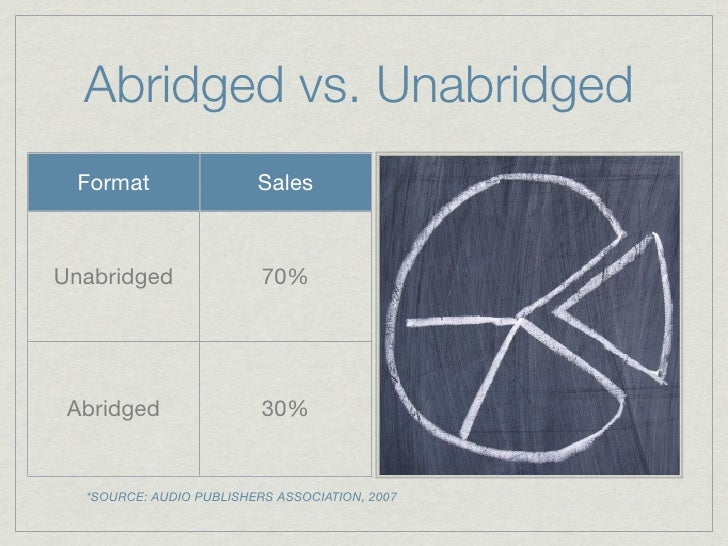Welcome to the first of what I hope will be an engaging series of conversations throughout this year about all things books! I want to pick topics that are important to us as readers, bloggers, and otherwise reading aficionados (so if you have any creative ideas, let me know!).
The first topic is something that I was recently reminded about that frustrates me – and I would love to see where you stand on this topic: abridging books.
By definition, an abridgement is “a shortened or condensed form of book, speech, etc, that still retains the basic contents” (Dictionary.com).
To me, there is really no good reason to abridge a book. I know that it is frequently a technique used to make a lengthy book accessible to a reading population that will not read a long book. But to me, if the author intended it to be 500, 700, 1000+ pages, then that is what I want to read. I don’t just want to read what someone thought would be representative enough of the book. Then you start to get into someone else’s opinions etc. and not the true form of the book. I can handle a long book!
Now I know that frequently you can pick up a different edition of a book and get the whole unabridged story, however, this isn’t always the case with audiobooks. Many times the only edition available on Audible is the abridged version – and I absolutely refuse to read this shortened version, so I will usually have to put it further down my reading list for when I eventually get the chance to read it in paper.

According to the above graphic, at least with regard to audio book sales, abridged versions make up 30% of the sales.
Source: SlideShare
A perfect example that happened to me this week – Gods and Generals by Jeff Shaara. The traditional version currently available on Amazon is 512 pages. The abridged version of the audio book available on Audible is 3 hours and 46 minutes in length. For comparison purposes, The Great Bridge by David McCullough, which is 562 pages in physical length (fairly similar length), is 27 hours and 29 minutes in unabridged audio book. My guess, a lot of Gods and Generals has been excised for the audiobook production – which makes me sad. Even though non-fiction tends to be read at a little slower pace than fiction, there really shouldn't be that much of a difference in length.
According to Goodreads, some of the most popularly shelved abridged books include: The Count of Monte Cristo by Alexandre Dumas (1276 pages); Don Quixote by Cervantes (1072 pages); Moby Dick by Herman Melville (720 pages); War and Peace by Leo Tolstoy (1423 pages); and Les Misérables by Victor Hugo (1488 pages).
What do you think of abridged books? Do you read them? Have you read any of these above named lengthy books in either their complete or abridged formats? Or both? What did you think? Anyone have a different explanation for abridgement than what I addressed above?
Love to hear what you think!
Copyright © 2015 by The Maiden’s Court



I don't have a strong opinion either way. I don't do a lot of audiobooks, so that part doesn't affect me. If I pick up a print book, I am most likely going for the complete version. But I'll admit that I'm not a 'classics' reader. I have trouble with the dialect/language structure from a couple of centuries ago. So I wouldn't mind an 'abridged' version that was retold in modern English. It's either that or the Cliff Notes version! ;)
ReplyDeleteI honestly can't read most classics for the same reason - I tend to find them very boring and dense. The only way I tend to get through them is on audio - when I choose to read them.
DeleteI think abridged books are important for younger audiences. There is no way I could've read some of the classic books I read as a young adult if they had not been abridged versions. Also, I am not of the belief that every author needs that many pages to tell a story. Some absolutely make every use of those 1,000 pages. Others could be condensed and nothing would be taken away because it is a lot of repetitiveness. So I guess I would have to say it depends on the book!
ReplyDeleteI had never thought about it in terms of YA versions - I had never really considered them as abridged - I always thought of them as more of an adaptation, but I guess you are probably more right than I am. And I'm totally cool with that! I think that there are times when parts of books can be cut without any real issues, but the thing I don't really like about abridgments is they are usually done by an editor or someone other than the author - and what they decide is worthy to be cut makes it more of an adaptation than the story as it was intended. That's my take on it.
Delete